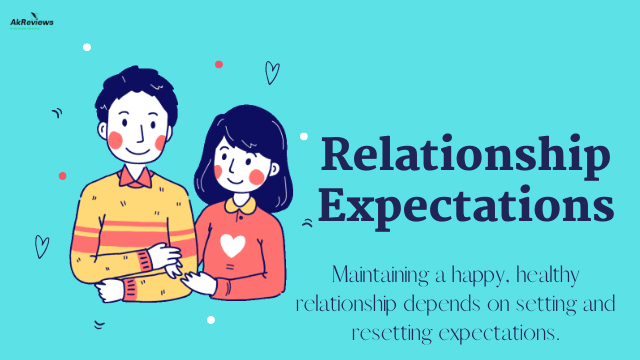Maintaining a happy, healthy relationship depends on setting and resetting expectations in a relationship as a team.
Understand your partner’s expectations in a relationship, and then make them yours with Complete Guide on expectations in a relationship for couples!
What are expectations in a relationship?
Some people think it’s best not to expect anything from your partner, but expectations may help you cultivate healthy relationships. If you want to form a well-rounded partnership, you may want to balance high expectations with unreasonable expectations. Expectations may look like rules to make sure partners are contributing to the relationship.
The expectations in a relationship. We can set a baseline for treatment. It’s nice to expect our partners to support us and love us. Our partner doesn’t have to be a mind reader. It’s hard to manage expectations. You don’t know what’s asking too much and what’s not enough. A couple with love, care, affection, and loyalty but don’t expect a sun-filled relationship with no conflict is what a couple should expect. It is important that you don’t expect your partner to be everything to you.
There is one thing for certain relationships, and that is discussing expectations. Similar to all parts of a relationship, we must discuss expectations. Discuss what you expect from the other person, and what expectations you have for one another, with your partner, and then review these regularly. Bad things will happen if you think you are going to fail. If you want to be successful, decide what you expect, set them and try to be reasonable.
You cannot expect your partner to change who he or she is. This is a very common problem in relationships. It’s important to set up expectations in several areas before the fear of not being met overwhelms the relationship. Communication is important in a loving relationship.

Different expectations for different things.
In a relationship, each partner brings something valuable to the table, and each contributes uniquely that benefits the relationship. It might not be as clear-cut as you think. Some of you might have different expectations for this new relationship. What are your expectations for the future? A healthy relationship can be created by being realistic about our expectations and being open about any challenges we face.
Communicate your expectations in a relationship.
When we have been together for many years, it’s not realistic to think our partner knows everything. As an individual, think about how you have changed over time, as well as how you might change in the future. Consider the history of the relationship and how expectations may change with transitions. Communication around expectations is important during transitions, such as becoming engaged, married, having children, and even during large moves and career changes. It is possible to maintain a sense of stability when there are clear expectations.
Lack of communication about expectations may lead to disconnection in which one partner may feel too much is being demanded of them, or that their partner is not present and supportive of them. If enough negative sentiment is present in the relationship, it may drive a partner to seek other options outside the relationship.

Reasonable Expectations
It’s important to note that we’re not suggesting that you don’t have a right to expect anything from your partner, we’re just suggesting that you know what you want from them. It’s true that the inverse is true. Both of you and your spouse should be treated with respect and dignity. Expect the two of them to be close and passionate. We expect you will be loved and supported. The relationship expectations are more closely related to standards than expectations.
False expectations include things like wanting your partner to change their values, be the basis of all happiness, or oppose male or female polarity. Don’t expect your partner to respond in the same way as you. Don’t expect things to be perfect. It’s the enemy of good to have perfect things.
Read this article to learn the 10 reasonable relationship expectations that should guide your discussions with your partner, and what you can say to help keep your relationship healthy.
1) Trust:
Get curious about each other’s inner world, practice empathizing, and build trust over time. A trusting relationship involves a commitment from both partners to make sure that their partner is secure, confident, and independent.
2) Commitment:
You need to understand your partner’s commitment to the relationship and discuss behaviors that show the level of commitment to prevent burnout or feelings of resentment when one partner perceives they are giving more than they get in return. If you aren’t concerned about your relationship and your health, you’ll have a harder time keeping your emotion under control.
3) Affection & appreciation:
You can show your love to someone by giving them a gift or something. You could do the same thing for your partner, but use your style. One person may prefer words of Affirmation, while another may prefer acts of Service. Be specific and authentic when communicating your love to your partner. You should appreciate your partner’s unique qualities and what they bring to your relationship.
4) Empathy:
People who are curious about others usually express their sympathies. Build empathy if you’re curious about someone else’s experience. You can use open-ended questions to figure out how someone else is feeling. It makes sense for your partner to feel this way if you set your emotions aside. The goal is to understand the other person’s perspective to get it right.
5) Friendship:
You can develop your friendship by showing interest in each other, which may include active listening throughout the day, and making time to engage in activities each person enjoys combating feelings of loneliness. You can feel safe sharing your feelings with someone you care about if you have a wonderful friendship. This will allow for the sharing of experiences, which will increase the amount of pleasure shared between you.
6) Satisfying sexual chemistry:
Sex is important in any relationship. They should discuss it frequently so that the couple feels safe. It is easy to bring your sexual needs to your partner when you talk openly about your sexual preferences. The conversations about sex, its meaning and where it was learned can increase understanding and connection between participants. Individual therapy can help you overcome sexual trauma by teaching you how to control the body and allow you to explore sex without fear of being violated.
7) Respect:
Ignoring criticism and using curiosity to hear and verify differing values, customs, and beliefs is Respect for each other’s differences. Compassion for others’ differences can remind us we are part of a team and that differences should be celebrated. Sharing the differences in our lives can ease the challenges we face when faced with differences.
8) Quality Time:
There are many ways to spend quality time together. Playing games, reading books, or cleaning the house are some examples of things that can be done together. To make it as easy as possible for you and your partner to work together is the primary goal. It is important to have a great experience that promotes connection and shared meaning. Being present with each other means engaging in physical touch, eye contact, and active listening and responding to each other’s bids for proximity, connection, and affection.
9) Kindness and generosity:
One of the best ways to build love in your relationship is to show kindness and generosity. Make sure you show each other how much you appreciate the action when one of you needs to do something. One action of kindness each day may be helpful in promoting a culture of politeness and gratitude within the relationship.
Unrealistic Expectations
Unrealistic expectations might contain limits on each other’s freedom. People who are fearful and fearful in their adult relationships develop avoidant patterns of relating to others. It is possible to shift your focus to develop a more secure relationship with more realistic expectations.
1) No arguments:
To make a positive change, it’s important to engage in productive discussions that promote growth by sharing different perspectives and voice concerns. If you avoid conflict in a relationship, you may feel you are walking on eggshells and your loved one may feel like he or she has a harder time admiring you as a person. This could lead to problems down the road.
2) Mind reading:
It is difficult to expect your partner to always know what you are thinking. The best conversations start with how the speaker feels and not what the listener thinks. You can use this to start a conversation that is more productive for you. If a difficult situation arises, it’s a good idea to have an important discussion about the possibility of greater respect for each other.
3) Always available:
Similar to mind reading, expecting your partner to provide comfort when you are stressed may make them fail. Making your partner feel loved. You don’t have to be withdrawn to learn how to soothe yourself. When your partner is unavailable, it may be helpful to make a list of support you have used in the past.
4) Spend time together:
Spending time alone with your partner isn’t detrimental to your relationship. They aren’t required to spend every hour with you. Spending time with your partner, friends and family, while engaging in your own interests and activities, may improve your relationship and improve your chances of having quality time together. You will determine what the right balance is for all of you when you reflect on your relationships.
5) Always in agreement:
Two people in a relationship can have differing life experiences. Expressing your feelings to your partner increases validation and reduces negative emotions when your partner isn’t supportive or is struggling to see your perspective.
6) Ready to Providing solutions:
It is not reasonable to always provide solutions to each other when we are stressed out. We can see it as dismissing or invalidating a person’s emotions when offering a solution too quickly. Sporadically, it’s not possible to find solutions to all problems. Asking if there is a solution desired before proposing one is a shift in mindset.
7) Forcing to change:
If you ask a significant other to change their behavior or personality, you need to be prepared for any reactions. Sporadically, it’s not possible to change a person’s personality or behavior with a significant other. You might feel lost, stressed, and unsafe if your life is constantly changing. Think about whether your partner’s negative thoughts about you make sense, and look at what your partner’s negative thoughts are about you.
8) Changing appearance:
People who are overly concerned about their partners’ weight, shape, and size can express their desire to remain attractive through criticism. Maintaining your level of attraction depends on maintaining your level of affection for your partner.
Talk about Healthy expectations:
To determine how realistic expectations could be established, it’s important to identify why unrealistic expectations are occurring. Jealousy from previous relationships causes some of these expectations. Start the conversation by exploring the goals of the relationship and how healthy expectations may promote your goals through, and I feel in perspective you should revisit these conversations and adjust your expectations as the relationship progresses.
You can’t assume to have the same expectations:
We find if differences in personality or values exist on them, there can be problems. When they are built on them, they can become problems. You can better understand each other’s expectations when you discuss your differences. When working with your partner, you need to be honest with yourself about whether you are more flexible or rigid. Ask questions to better understand their need for respect and reflect your understanding in helping your partner feel heard and cared for.
1. Expectations About Money:
It frustrated many couples with money, not just the ones with a lot. We remember it paid us for our time and talents, not for being paid to do things. If one partner expects to pay the bills, but the other doesn’t, things can easily go bad. If one partner expects his or her partner to provide a certain lifestyle, but unforeseen expenses occur, it’s the same. You will be in for a rough trip if you don’t have regular conversations about money with your partner. Money can make people stronger. It is easy for one person to get caught up in being ignorant and having a negative attitude that something bad happens to them, and they are upset. Couples should have weekly sat downs to discuss their finances. Get your priorities in order and look at where you are going.
2. Expectations About What Your Partner Provides You:
People think their spouse is already theirs when they get married. Who wouldn’t think that a person who does every activity with you, enjoys every concert, likes to go to the same restaurants, and cheer on the same teams is his dear half? Two very different people with singular interests and inclinations are getting married. Hopefully most will pass, but it’s better if a few don’t. Friends, colleagues, family members and others are who this is for. If you have a boyfriend, you can call if you want to go to a sporting event, and someone who is good at last-minute entertainment, and someone who is always available when you need help, understands that people have different tasks in their life that may end when. You create the expectation that your partner can do everything for you. You will be disappointed if he/she fails.
It is common for couples to think that if their partner doesn’t understand how they feel or what they want, it’s a reflection of how little they care. It’s a double risk because you’re nervous, and your partner has to guess what you want or need. They excavated a deeper hole if they guessed wrong. In these situations, couples need to have one scenario which can be followed by another. Keep your mind clear and let your partner know what you expect. Buckley says you should write a script, so your partner knows what you’re thinking. They know what you want, how you want it, and can help you understand if they can meet your needs.
3. Expectations About Who You Are as a Couple:
The thieves of happiness are those who compare. There are many opportunities to look at the glamorous and skillful lives of people on social media who are ruining other people’s lives. You need to focus on the qualities your partner doesn’t have while ignoring the qualities your partner has because looking at someone’s life through Facebook or Instagram can set unrealistic standards. Challenging new things is one thing, but expecting your partner to be an entirely different person is entirely different. It’s easy to think that all relationships are the same as those you’re exploring or displaying in a very lightweight format.
A relationship isn’t a race; it’s a marathon. It takes a lot of hard work and patience to get through it. You must be patient and understanding. In fact, you should always remember that the way to keep your relationship going well is to be open and honest with each other. You should avoid being judgmental about your partner’s mistakes. Be open-minded to learn from your mistakes, so you don’t repeat them. Never try to dominate your partner; don’t prove your superiority over your partner. Instead, be the better person, and be supportive and nurturing. It’s okay to be compassionate and respectful. That’s what makes the difference in having a healthy relationship.
Difference between standards and expectations:
We should get, currently the standard for what is samples. They are a representation of what you expect from your partner. It is possible to understand the pleasure, benefits, beliefs, feelings, and emotions of life. We want someone to do something in the future, and that’s why we have an expectation. We become discouraged, sad, and angry when our hopes are not realized. Patterns result from the sameness or principle forces that we are all surrounded by. We and others follow higher standards when people around us do that. I want to dream bigger, work harder and believe in myself more deeply.
Raising the standard doesn’t have to be messed with. We can build the life of your dreams thanks to learning to recognize the negative. If someone doesn’t meet your criteria, you can move on completely. Although your partner may meet all of your standards, they still fall short of your expectations in the relationship. The expectations that lead to relationships are these.

Why expectations in a relationship can cause problems
The first thing we need to do is begin with reason. Is there a reason quarrels arise in the first place? There is a short answer, that is lean. Our contribution to the relationship is brought about by what we expect the relationship to look like. Relationship expectations are not realistic and can differ from person to person. Some people want your spouse to throw out the trash, and other people want you to have breakfast at the table every morning. It can build a relationship if both parties know it was received and no one else talks about it.
The problem with expectations is that they are a concept. Everyone has one, and it doesn’t always coincide with other people’s opinions. Knowing what we need in a relationship is an important part of this debate. If you both feel the same way about the relationship, you can set reasonable expectations and act. If you can articulate your needs, you can identify these expectations.
How to Manage Expectations in a Relationship?
There are solutions to resolve conflicting expectations in a relationship. Inevitably, there will be conflict when we focus on hope instead of gratitude. The way two people fold a napkin might be different, but is that the wrong way to fold it? Hope without gratitude leads to nagging and frustration, which leads to speculation and fights. Think about the fights you and your partner have had. Can you tell me how many battles you are fighting against? Does any of them have a good work ethic? Most of the answers are not correct. The minimum is a topic we argue about. Think about your expectations for the relationship. Are the towels comfortable for stress? It’s almost certain that not. Taking the time to do things that are doable but also beneficial to the energy and longevity of your relationship is a good idea.
1. Prioritize appreciation over expectations:
Gain knowledge about how to turn gratitude into hope. All relationships and the world will change at that point. It’s better to focus on the positives instead of the negatives. This will bring A big part of the relationship about. They did their best to throw the clothes away, even though they may not be folding the towel as much as they would like. They could make you do the dishes or walk your dog because you worked too long. Don’t forget to take care of yourself and always have something to be thankful for. What made you want to come here in the first place? Couldn’t put the towels in a bin. They are kind and loving in their lives. It is possible to change your whole life by turning hope into gratitude. We can reduce negative expectations by using the same approach to relationships, as these feelings can apply to everything.
2. Express compassion:
What you can expect in a relationship is compassion. Compassion is required in achieving a relationship. It’s important to learn how to manage hope in a relationship, but remember that hope fosters warmth. You are the most important thing in the end.
3. Show respect:
The foundation of a relationship is respect. Good communication is based on respecting the feelings of others. Do not change your relationship. Be patient, play, and switch places. It is possible to find a solution there.
4. Demonstrate consideration:
The thinking of the partners, their interests, and the expectations of the relationship are all important in a healthy relationship. The benefits of the relationship must be more important than the rules of the relationship in order to teach supervision. It’s difficult when it comes to relationship needs because it’s easy to see rules as the basis for a partnership. When you value your partner more than you do your rights, you set the stage for your expectations to be met.
5. Devote time to your partner:
Spending time with your partner is one of the best things you can do for a relationship. When tough times become a secondary priority, don’t allow cooperation to buy you time to strengthen your relationship. With developing a religion and culture that fosters relationships, it shows that relationships are more important than any other thing.
6. Never question the nature of your relationship:
Asking your partner what they think is one of the worst ways to learn how to manage hope in a relationship. Asking about the status of the relationship builds trust and strengthens it. A problem does not mean the relationship is bad.
7. Avoid repetition:
You need to change your approach if you’re arguing with your partner. Without a dull side, you will create a circle that will make both sides feel defeated. You can take the high road and come back from the dispute. Relax and come together and think about what you’re arguing about. You are setting high standards for what you can expect from your relationship with your partner if you do that.
8. Never threaten your relationship:
One of the primary expectations in a relationship is that there will be give and take and mutual dialogue. Threatening your relationship with ultimatums helps nothing, since it shuts down communication. If you’re at the point of threatening your partnership, it’s time to take a break and rethink the conversation.
9. Don’t stagnate:
Learning to manage expectations doesn’t have to be a onetime commitment. To make sure you need help, it’s a regular conversation that hits the ground. If you didn’t fight that day, your relationship is fine. Don’t settle for stagnation. You are building a special relationship when you promise an endless improvement.
10. Don’t compare your relationship to others’ relationships
Comparison is the thief of joy. It’s the little voice in your head that tells you that your relationship isn’t good enough, or that someone else’s is better. But comparison is a poison, one that can sap the energy and happiness from any relationship. So how can you stop comparing? Start by realizing that everyone’s relationship is different, and there’s no right or wrong way to do things. Instead of aiming to be like someone else, aim to be yourself and see how that goes.
In conclusion, a healthy relationship is based on realistic expectations. By setting proper boundaries and communicating effectively, couples can avoid unnecessary conflicts and build a foundation of mutual respect. If you are struggling to establish healthy expectations in your relationship, consider seeking professional help. Thanks for reading!








